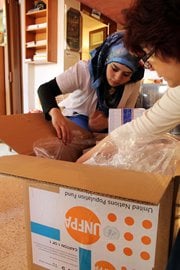
Security events that started in Syria in April 2011 led to the displacement of Syrians across the Lebanese-Syrian borders. Cumulatively, since April 2011, more than 27,000 displaced Syrians are being assisted throughout the country, mostly in the North and in the Bekaa areas. Over 75% of refugees are woman and children.
In order to respond to the needs of the refugees in general and women and girls in particular, UNFPA Lebanon activated its emergency response mechanism and in accordance with its preparedness and contingency plan. It started by creating a humanitarian response team from within the UNFPA Lebanon and gathering more than half its office staff for supporting humanitarian efforts. Additional staff was engaged to ensure needed expertise and skills are readily available.
In parallel, UNFPA worked on enhancing coordination, expanding partnerships, and assessing needs in close collaboration with key humanitarian actors including pertinent agencies within the UN Coutry Team. As such, UNFPA participated in central and peripheral meetings of the Protection and Heath working groups; proactively contributed to the regional response plan; and coordinated with YMCA/UNICE/WHO for awareness raising campaign on health issues including safe motherhood and sexually transmitted infections. A comprehensive assessment on RH and GBV among Syrian women and girls will soon be undertaken in partnership with Yale University led by a national researcher.
Procurement of essential commodities was made possible through Emergency Funds. As such, based on the needs assessments in affected areas and through close coordination with international and local NGOs, a total of 6 RH emergency kits were distributed to medical/health dispensaries in the North of Lebanon i.e. Mechha (photos) and Wadi Khaled along the border.
In addition, UNFPA concluded an agreement with the Danish Refugee Council on an action plan for the distribution of a 3-month supply of sanitary pads. As a result, and by mid-July, a total of 20,000 pieces will be distributed in both the North and Bekaa areas.
In parallel, UNFPA Lebanon continued rolling out the implementation of the trainings on Minimum Initial Service Package (MISP) for Sexual and Reproductive Health in Crises in areas hosting refugees. After January’s first training in the North, a second one was organized in the Bekaa during the first week of June. These trainings are implemented in close collaboration with the MOPH and the Lebanese Society for Obstetrics and Gynecology and aim at reinforcing national capacities of health planners, managers and providers for responding efficiently to RH needs in crisis situations.
Based on increased refugees influx and resulting need to cater for young girls and women’s wellbeing and protection, UNFPA Lebanon will further pursue its focused emergency response actions. Indeed, UNFPA Lebanon will be implementing additional interventions related to RH and dignity kits for Syrian refugee women and girls, between June and December 2012.

